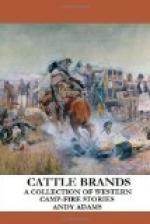No one found trouble in getting to sleep that night, and the next day arts long forgotten by most of us were revived. Some plowed up the old branding-pen for a garden. Others cut logs for a cabin. Every one did two ordinary days’ work. The getting of the logs together was the hardest. We sawed and chopped and hewed for dear life. The first few days Jack and one of the boys planted a fine big garden. On the fourth day we gave up the tent, as the smoke curled upward from our own chimney, in the way that it does in well-told stories. The last night we spent with Jack was one long to be remembered. A bright fire snapped and crackled in the ample fireplace. Every one told stories. Several of the boys could sing “The Lone Star Cow-trail,” while “Sam Bass” and “Bonnie Black Bess” were given with a vim.
The next morning we were to leave for camp. One of the boys who would work for us that summer, but whose name was not on the pay-roll until the round-up, stayed with Jack. We all went home feeling fine, and leaving Jack happy as a bird in his new possession. As we were saddling up to leave, Miller said to Jack, “Now if you’re any good, you’ll delude some girl to keep house for you ’twixt now and fall. Remember what the Holy Book says about it being hard luck for man to be alone. You notice all your boomer neighbors have wives. That’s a hint to you to do likewise.”
We were on the point of mounting, when the coyote horse began to act up in great shape. Some one said to Edwards, “Loosen your cinches!” “Oh, it’s nothing but the corn he’s been eating and a few days’ rest,” said Miller. “He’s just running a little bluff on Billy.” As Edwards went to put his foot in the stirrup a second time, the coyote reared like a circus horse. “Now look here, colty,” said Billy, speaking to the horse, “my daddy rode with Old John Morgan, the Confederate cavalry raider, and he’d be ashamed of any boy he ever raised that couldn’t ride a bad horse like you. You’re plum foolish to act this way. Do you think I’ll walk and lead you home?” He led him out a few rods from the others and mounted him without any trouble. “He just wants to show Jack how it affects a cow-horse to graze a few days on a boomer’s claim,—that’s all,” said Edwards, when he joined us.
“Now, Jack,” said Miller, as a final parting, “if you want a cow, I’ll send one down, or if you need anything, let us know and we’ll come a-running. It’s a bad example you’ve set us to go booming this way, but we want to make a howling success out of you, so we can visit you next winter. And mind what I told you about getting married,” he called back as he rode away.
We reached camp by late noon. Miller kept up his talk about what a fine move Jack had made; said that we must get him a stray beef for his next winter’s meat; kept figuring constantly what else he could do for Jack. “You come around in a few years and you’ll find him as cosy as a coon, and better off than any of us,” said Miller, when we were talking about his farming. “I’ve slept under wet blankets with him, and watched him kindle a fire in the snow, too often not to know what he’s made of. There’s good stuff in that little rascal.”




